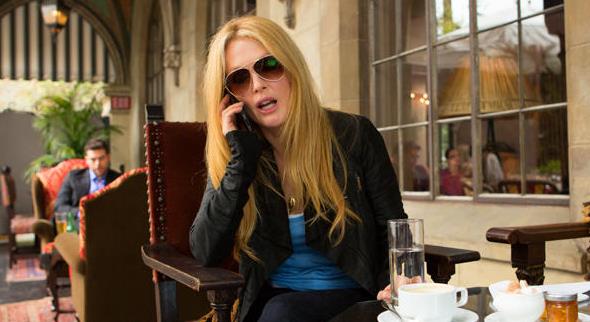Maps to the Stars – Walking that fine line between disturbing, traumatic tension and campy perversion has always been David Cronenberg’s speciality. Whether it’s stylistically subdued but potent (Spider, A Dangerous Method) or insanely laced with theory and alternative reality (Videodrome, Crash) – or that sweet spot in between (A History of Violence) – Cronenberg is determined to make films his own way and lure audiences into his web of tormented souls and psychosexual chaos. Within the first ten minutes of the hallucinatory and dream-like polish of Maps to the Stars, it’s clear that Cronenberg is espousing usual formula and setting his eyes on Hollywood subversion. But what progressively reveals itself is a film of shocking depth and unpredictable absurdity, and horrifyingly amusing (or amusingly horrifying) study of characters wired by their pasts. The warped story focuses on two titans of the entertainment industry – Havana Segrand (Julianne Moore) and Benji Weiss (Evan Bird) – who are haunted by personal demons and terrifying secrets involving their families’ unusual dynamics. Havana constantly sees the ghost of her dead mother (Sarah Gadon) who played an iconic role Havana is desperately trying to revive, while Benji sees disturbing visions and is visited by his estranged sister Agatha (Mia Wasikowska) – in town working as Havana’s personal assistant and harboring ulterior motives. Also factoring into the story are Agatha and Benji’s parents (John Cusack, Olivia Williams), a self-help guru and business tycoon in the industry. Together, they are all part of a Hollywood family who indulges in perverse and toxic secrets that reflect the corrosive environment in which they thrive. Bruce Wagner’s screenplay is unmerciful in its scathing showbiz satire, and the story is as chaotic, overblown, and operatic as they come. Though, as Cronenberg often does, he makes it work by perfecting a tonal balance of dark comedy and horrifying drama, and makes it linger by grounding the absurdity of characters’ troubles with disturbing truths. He’s clearly fascinated by the family as not only an entity, but a structure – a structure in which people are trapped, secrets are kept, traumas are unforgotten, and harm is stained. By drawing compelling and palpable parallels to the entertainment at large cleverly through his dream-like prism of a tone, Cronenberg’s film is a who-haunts-who tale in which incestuous relations (figuratively and literally) scare and scar each member and the possibility of escape is as unattainable as it is dangerous. Demons, as Agatha, Benji, and Havana realize, can be kept in only so long until they prove lethal. Cronenberg and Wagner make for a striking team, winding together a story and characters that have serious sting. The ensemble is also uniformly unexpected and inspired – Robert Pattinson’s supporting turn is impressive, Cusack and Williams are chilling, and Bird is remarkably impacting and resonant. But Wasikowska and Moore illuminate the brewing chaos of tinseltown with ferocity. Wasikowska, as she did in Park Chan-wook’s Stoker, brings life to a character of unhinged and vibrant energy with a frightening ease. Moore is simply mind-blowing – having the most fun onscreen in several years, she blends the insanity of Gloria Swanson with the childish ignorance of Lindsay Lohan, creating a monstrous anti-heroine determined to circle her way around empathy. It’s a jarring and jaw-breaking turn, showing Moore sinking her teeth into a character with a rare combination of glee, determination, and understanding. Cronenberg orchestrates all his actors, and the rest of his ingredients – including a minimal but alluring score from Howard Shore – into a film that may seem like the twisted cousin of Sunset Boulevard and Mulholland Dr., yet is a lurid and potent nightmare that has a terrorizing bite of its own.
Here’s the trailer:


